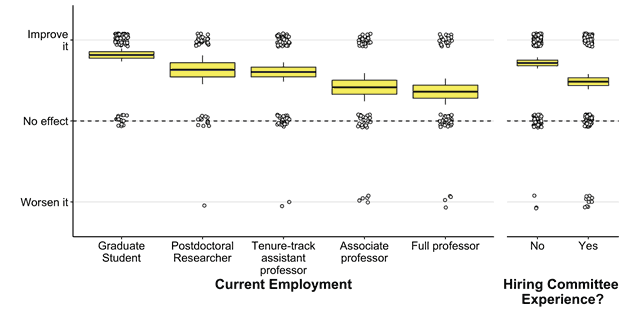In the Fall of 2020, we conducted a survey of members of the academic psychology community (n = 365) to explore attitudes regarding hiring practices by academic search committees toward job candidates with non-academic work experience (e.g., private and public sectors), as well as beliefs about how such hires would impact the field.
The full report manuscript and a discussion of its implications for early career researchers and academia are available here. All data and analysis scripts may be found publicly available via the Open Science Framework (https://osf.io/7ut6r/).
Authors
- Daniel A. Yudkin, Social and Behavioral Science Initiative, University of Pennsylvania
- Ryan M. Stolier, Department of Psychology, Columbia University
- Neil A. Lewis, Jr., Department of Communication, Cornell University
Top line results:
- Scholars at all seniority levels believe that candidates with non-academic work experience are viewed at least somewhat negatively by hiring committees.
- Scholars at all seniority levels also believe that adopting a more accepting attitude toward such candidates would improve the field (see Figure below).
- Responses from scholars who themselves had served on hiring committees suggest such candidates may not be viewed as negatively as some early-career researchers believe (see Figure 1 in the report).
This research serves as an initial step in understanding how candidates with non-academic work experience are perceived by academic hiring committees in psychological science. As such, it has the potential to inform early-career researchers’ employment decisions in an ever-tightening job market—particularly those from underrepresented backgrounds, who may not have the external resources needed to withstand many years in a low-paying postdoctoral position. Ultimately this project may contribute to a larger conversation on how changing perceptions around nontraditional career trajectories may benefit both candidates themselves and the field as a whole.
Anticipated Effect on Field of Adopting a More Accepting Attitude toward Candidates With Non-academic Work Experience

Figure. Responses to the question, “Suppose hiring committees became more accepting of hiring applicants with recent non-academic employment. What effect would this have on the field of psychology?” (1 Worsen it - 3 Improve it). Responses are broken down by career stage (left panel), and experience on academic hiring committees (right panel). Box centers represent group mean; box edges SEM; whiskers 95% confidence intervals. Dots reflect jittered individual responses, n = 365. Regardless of seniority, people believe greater acceptance would improve the field, yet these perceptions diminish with seniority. Scholars with hiring committee experience believe a more accepting attitude would have less of a positive effect than those without such experience.
References
Clair, Rebekah St, Tamara Hutto, Cora MacBeth, Wendy Newstetter, Nael A. McCarty, and Julia Melkers. 2017. “The new normal: Adapting doctoral trainee career preparation for broad career paths in science.” PLoS ONE 12 (5): 1–19. https://doi.org/10.1371/journal.pone.0177035.
Kelsky, Karen. 2020. “The Professor Is In: Stranded on the Academic Job Market This Year?” Chronicle of Higher Education, 1–3. https://www.chronicle.com/article/the-professor-is-in-stranded-on-the-academic-job-market-this-year/.
Wong, Tian An. 2020. “The US hiring freeze is leaving contingent faculty out in the cold.” Times Higher Education, 1–7. https://www.timeshighereducation.com/opinion/us-hiring-freeze-leaving- contingent-faculty-out-cold.




